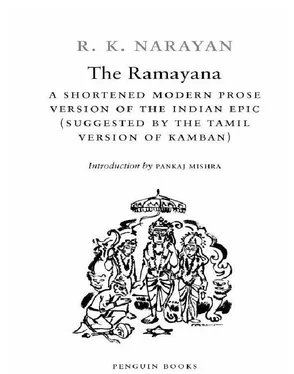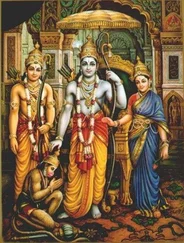Махариши Вальмики - The Ramayana
Здесь есть возможность читать онлайн «Махариши Вальмики - The Ramayana» весь текст электронной книги совершенно бесплатно (целиком полную версию без сокращений). В некоторых случаях можно слушать аудио, скачать через торрент в формате fb2 и присутствует краткое содержание. Жанр: Старинная литература, на английском языке. Описание произведения, (предисловие) а так же отзывы посетителей доступны на портале библиотеки ЛибКат.
- Название:The Ramayana
- Автор:
- Жанр:
- Год:неизвестен
- ISBN:нет данных
- Рейтинг книги:3 / 5. Голосов: 1
-
Избранное:Добавить в избранное
- Отзывы:
-
Ваша оценка:
- 60
- 1
- 2
- 3
- 4
- 5
The Ramayana: краткое содержание, описание и аннотация
Предлагаем к чтению аннотацию, описание, краткое содержание или предисловие (зависит от того, что написал сам автор книги «The Ramayana»). Если вы не нашли необходимую информацию о книге — напишите в комментариях, мы постараемся отыскать её.
The Ramayana — читать онлайн бесплатно полную книгу (весь текст) целиком
Ниже представлен текст книги, разбитый по страницам. Система сохранения места последней прочитанной страницы, позволяет с удобством читать онлайн бесплатно книгу «The Ramayana», без необходимости каждый раз заново искать на чём Вы остановились. Поставьте закладку, и сможете в любой момент перейти на страницу, на которой закончили чтение.
Интервал:
Закладка:
The road to Mithila was crowded with men, women, and children. When the huge mass began to assemble and move down the road, the world looked suddenly shrunken in size. Elephants bearing pennants and flags, their foreheads covered with gold plates, horses prancing and trotting, and a variety of ox-drawn carriages and chariots were on the move, in addition to a vast throng on foot. The sun’s rays were caught and reflected by the thousands of white satin umbrellas and the brilliant decorations of the army men. Heavy-breasted women clad in gossamer-like draperies sat on dark elephants, their necklaces swaying with the movement of the elephants, flanked by warriors bearing swords and bows on horseback.
The poet is especially happy and detailed when describing the mood and the activity of the young in this festive crowd. A youth followed a carriage at a trot, his eyes fixed on the window at which a face had appeared a little while ago, hoping for another glimpse of that face. Another young man could not take his eye off the lightly covered breast of a girl in a chariot; he tried to keep ahead of it, constantly looking back over his shoulder, unaware of what was in front, and bumping the hindquarters of the elephants on the march. When a girl inadvertently slipped down the back of a horse, another young man picked her up; but instead of setting her down after the rescue, he journeyed on with her in his arms. Another went along brooding and reflecting as he gazed on his beloved. Couples who had had a quarrel over some detail of the arrangements for this journey walked side by side without speaking, the woman not caring to wear a flower in her hair, but only a frown on her face, yet close enough to each other to avoid separation. One youth who was not spoken to but was agitated by the messages conveyed by the eloquent eyes of a damsel said, “You won’t speak? But surely, when you cross the river, you’ll want my strong arms to carry you, and how shall I know if you don’t speak to me? I know that you object only to speech, not to my touch, inevitable you’ll need that when we come to the river’s edge.”
Camels bearing enormous loads went along with parched throats until they could find the bitter margosa leaves—since they avoid tender greenery—and were thirsty again after chewing them, like men who look only for wine to quench their thirst, which again produces more thirst. Sturdy menfolk bore on their shoulders gifts and supplies for the journey.
Brahmins who practised austerities followed, remaining aloof, afraid alike to walk amongst the elephants, for fear of being jostled, and in the areas where there were women, who might distract their inner vision. Some hopped along lightly on their toes, in order not to trample on any live creature on the ground; others held their fingers over their nostrils, both to perform breath control and to keep the fingers from touching their nether portions while their minds were fixed on God.
The noise of the rolling chariot wheels, trumpets, and drums, and the general din, made it impossible for anyone to hear what anyone else was saying. After a while people moved along dumbly, communicating with each other only by signs, their feet raising an enormous trail of dust. Bullocks drawing wagons loaded with baggage, excited by the noise of drums, suddenly snapped off their yokes and ran helter-skelter, adding to the melee, leaving the baggage scattered on the road. Elephants, when they noticed a tank or a pond, charged away for a plunge, and remained submerged in the water up to their white tusks. Musicians sat on horseback playing their instruments and singing.
Behind this army, the king’s favourites in the women’s apartments followed. Surrounded by a thousand attendants, Queen Kaikeyi came in her palanquin. Next came Sumithra, accompanied by two thousand attendants. Surrounded by her own musicians came Kausalya, mother of Rama. She had also in her company several dwarfs and hunchbacks and other freaks. But her main companions were sixty thousand women of great beauty and accomplishment who followed her in a variety of vehicles. In a white palanquin studded with pearls, sage Vasishtha, chief mentor at the court, followed, surrounded by two thousand brahmins and priests. Bharatha and Sathrugna, also younger brothers of Rama, came next. Dasaratha, after performing his daily duties and religious rites and presentation of gifts to brahmins, started to leave his palace at an auspicious conjunction of the planets, ushered by a number of priests, men bearing in their arms golden pots filled with holy waters which they sprinkled on his path, while several women recited hymns.
When the King emerged from his palace, many rulers from the neighbouring states were waiting to greet him. Conch and trumpets were sounded, and loud cheering and the recital of honours, when his carriage began to move.
After journeying for a distance of two yojanas, the King with his army and followers camped in the shadow of Mount Saila. Next day the camp moved on to a grove beside a river.
The forward portions of the advance party, which had already reached Mithila, were received and absorbed into homes, palaces, and camps in the capital. As further contingents kept coming in, they too were received. The line of movement was continuous from Ayodhya to Mithila. King Dasaratha’s party was the last to arrive. When the scouts who watched for their arrival flew back on horses to report that Dasaratha’s party had been sighted, Janaka went forth with his ministers and officials and guards of honour to receive him. The two kings met, greeted each other, exchanged polite formalities; then Janaka invited Dasaratha to get into his own chariot and proceeded towards the capital. While they were entering the gates of the city, Rama, accompanied by Lakshmana, met them, greeted his father, and welcomed him. Dasaratha swelled with pride at the sight of his son, whose stature seemed so much grander now.
At this point Kamban begins to describe the preparations for the wedding of Rama and Sita. It is one of the most fascinating sections of the epic. The details of the wedding pavilion; the decorations; the arrival of guests from other countries; the flowers and gaiety; the citizens’ joy and participation; the activities in the bride’s house and then at the bridegroom’s, and the preparation of the bride and bridegroom themselves: their clothes and jewellery, the moods they were in—all are described by Kamban in minute detail, running to several thousand lines of poetry.
At an auspicious conjunction of the planets suitable to the horoscopes of Rama and Sita, in ceremonials conducted by the high priests of Mithila and Ayodhya in Janaka’s court, Rama and Sita became man and wife.
“Those who were together only a little while ago came together again, and there was no need for any elaborate ritual of speech between them,” says Kamban, describing the couple’s first meeting at the conclusion of the wedding ceremonies.
Through Janaka’s efforts, Rama’s three brothers were also found brides and were married at the same time, in Mithila. When the celebrations ended, King Dasaratha started back for Ayodhya, with his sons bringing home their wives. On the day they left, Viswamithra told Dasaratha, “Now I return to you Rama and Lakshmana. Their achievements are immeasurable, but there is much more ahead. They are blessed men.” Then he took leave of them and abruptly left northward. He was retiring into the Himalayas, away from all activities, to spend the rest of his days in contemplation.
3
TWO PROMISES REVIVED
In his busy life Dasaratha perhaps had never studied his mirror properly. He had had no occasion to scrutinize himself too long in the mirror or engage himself in any introspection. Suddenly one day he noticed the whitening hair and the wrinkles under his eyes—noticed the slight tremor of his hands, the fatigue of his legs while engaged in a game, and realized that age had come on. It was by no means inconsiderable. The original poet Valmiki mentions that Dasaratha was sixty thousand years old! In our modern reckoning we may not agree with that figure, but put it at sixty, seventy, or eighty years; whatever it was, ripeness is indicated.
Читать дальшеИнтервал:
Закладка:
Похожие книги на «The Ramayana»
Представляем Вашему вниманию похожие книги на «The Ramayana» списком для выбора. Мы отобрали схожую по названию и смыслу литературу в надежде предоставить читателям больше вариантов отыскать новые, интересные, ещё непрочитанные произведения.
Обсуждение, отзывы о книге «The Ramayana» и просто собственные мнения читателей. Оставьте ваши комментарии, напишите, что Вы думаете о произведении, его смысле или главных героях. Укажите что конкретно понравилось, а что нет, и почему Вы так считаете.












